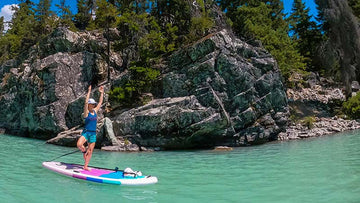Ultimate Guide to Beach Safety: Stay Safe and Enjoy the Sun

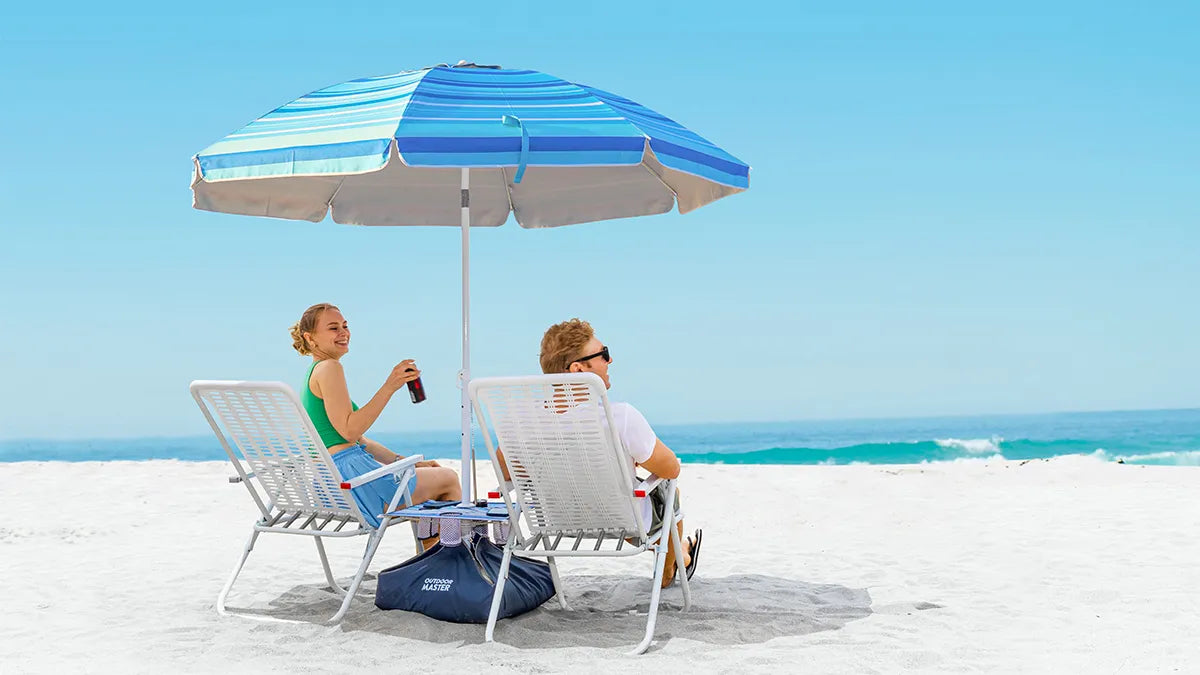
Welcome to our ultimate guide to beach safety! Whether you're a seasoned beachgoer or planning your first seaside vacation, it's important to prioritize your safety while enjoying the sun, sand, and sea.
In this comprehensive article, we will provide you with valuable tips, precautions, and essential knowledge to ensure your beach experience remains fun, relaxing, and free from potential hazards. So grab your sunscreen and let's dive into the world of beach safety!
Understanding the Hazards: Common Beach Dangers to Be Aware Of
Before hitting the beach, it's crucial to familiarize yourself with the common hazards you may encounter. By being aware of these dangers, you can take proactive measures to protect yourself and your loved ones. Here are some key hazards to keep in mind:
Rip Currents: The Silent Threat Beneath the Waves
Rip currents are powerful and narrow channels of water that flow rapidly away from the shore. They can catch even the most experienced swimmers off guard, pulling them away from safety. To stay safe from rip currents:
- Look for warning signs or check with lifeguards about current conditions.
- If caught in a rip current, swim parallel to the shore until you escape its pull.
- Avoid fighting against the current or swimming directly back to shore.
Sun Exposure: Protecting Your Skin from Harmful UV Rays
Excessive sun exposure can lead to sunburns, premature aging, and an increased risk of skin cancer. Here's how to protect yourself:
- Apply a broad-spectrum sunscreen with at least SPF 30 before heading to the beach.
- Reapply sunscreen every two hours or after swimming.
- Seek shade during peak sun hours, typically between 10 am and 4 pm.
- Wear protective clothing, such as hats, sunglasses, and lightweight cover-ups.
USE CODE OMBLOG20 FOR 10% OFF
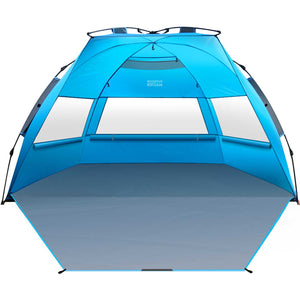
Pop Up Beach Tent
A UPF50+ pop-up wind-tight tent for 3-4 people with cool ventilation.
Shop Now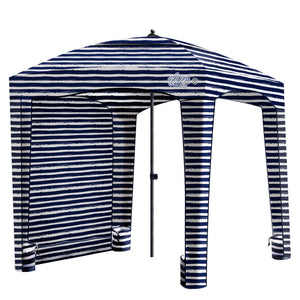
Beach Cabana
UPF 50+UV protection beach cabana for family
Shop NowBeach Dehydration: Staying Hydrated under the Sun
Spending time under the scorching sun can cause dehydration. To stay hydrated on the beach:
- Drink plenty of water throughout the day, even if you don't feel thirsty.
- Avoid excessive alcohol consumption, as it can dehydrate you further.
- Pack a cooler with chilled water and hydrating beverages to have on hand.
Marine Life Encounters: Navigating Wildlife Safely
While marine life encounters can be exciting, it's essential to interact with wildlife responsibly. Consider the following tips:
- Avoid touching or feeding marine animals, as they may become stressed or aggressive.
- Give sea creatures ample space and observe them from a safe distance.
- Be cautious of jellyfish and other stinging creatures by checking local advisories.
Preparing for a Safe Beach Day: Essential Tips and Must-Have Items
Now that you're aware of the hazards, let's dive into the necessary preparations for a safe and enjoyable day at the beach. Here are some essential tips and must-have items:
Planning and Research: Choosing the Right Beach and Weather Conditions
Before heading out, research the beach you plan to visit. Consider the following factors:
- Check weather forecasts to ensure suitable conditions for swimming and sunbathing.
- Look for beaches with lifeguards on duty, as they provide an additional layer of safety.
- Find out if there are any specific regulations or restrictions in place, such as leash laws for pets.
Packing the Essentials: What to Bring for a Safe Beach Experience
To have a worry-free day at the beach, make sure to pack the essentials that will enhance your safety, comfort, and overall enjoyment. Here's a list of items you should consider including in your beach bag:
Sunglasses: Protect your eyes from the sun's harmful UV rays with a pair of quality sunglasses. Opt for photochromic or polarized sunglasses to ensure optimal eye protection and clear vision. USE CODE OMBLOG20 FOR 10% OFF
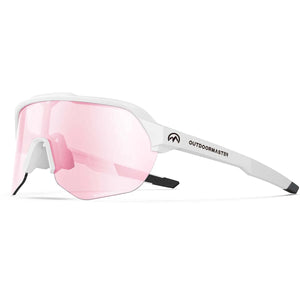
Hawk HD Photochromic
Auto VLT Adjust to UV Light
Shop Now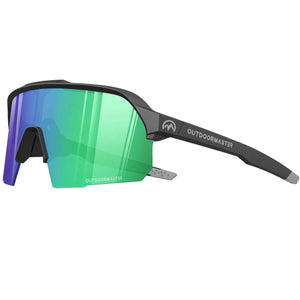
Hawk HD Polarized
Clear Lens VLT 99% Included
Shop NowSunscreen: Shield your skin from the sun's intense rays by applying and regularly reapplying a broad-spectrum sunscreen with at least SPF 30. Don't forget to cover all exposed areas, including your face, neck, ears, and feet.
Beach Shades: Create a shaded oasis on the beach with beach shades such as pop-up beach tents, beach umbrellas, or beach cabanas. These provide a comfortable retreat from the sun, allowing you to relax and cool off. USE CODE OMBLOG20 FOR 10% OFF
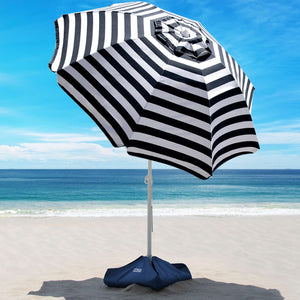
Beach Umbrella
A tilt-adjustable UPF50+ beach umbrella that's wind-steady and secures your drink.
Shop NowBeach Towels: Pack a couple of large beach towels for lounging on the sand. Look for quick-drying and sand-resistant options that are lightweight and easy to carry.
Water: Stay hydrated throughout the day by bringing an ample supply of water. Opt for reusable water bottles or a hydration pack to minimize waste and ensure you have enough fluids to keep you hydrated under the sun.
Snacks: Pack some nutritious snacks to keep your energy levels up. Opt for light and refreshing options such as fruits, granola bars, or pre-made sandwiches. Avoid foods that spoil easily in the heat.
Beach Chair: Consider bringing a portable beach chair for added comfort and relaxation. Look for lightweight and foldable options that are easy to carry and set up.
Beach Blanket: A beach blanket provides a clean and comfortable surface for sitting or lying down on the sand. Look for sand-resistant and waterproof blankets for added convenience.
Beach Bag: Choose a spacious and durable beach bag to carry all your essentials. Look for one with multiple compartments to keep items organized and secure.
First Aid Kit: It's always wise to have a basic first aid kit on hand for any minor injuries or incidents that may occur. Include items such as adhesive bandages, antiseptic wipes, pain relievers, and any necessary personal medications.
Remember to check the specific regulations and guidelines of the beach you plan to visit as some may have restrictions on certain items or activities. By packing these essentials, you'll be well-prepared for a safe and enjoyable day at the beach.
FAQs (Frequently Asked Questions)
Can I wear my regular sunglasses to the beach?
While regular sunglasses offer some protection, it's best to opt for sunglasses with UV protection, such as photochromic or polarized lenses, specifically designed to shield your eyes from the sun's harmful rays.
How often should I reapply sunscreen at the beach?
It's recommended to reapply sunscreen every two hours, or more frequently if you've been swimming or sweating. Be sure to follow the instructions on the sunscreen product for optimal protection.
Are pop-up beach tents difficult to set up?
Pop-up beach tents are designed for easy setup and takedown. They typically require minimal assembly, allowing you to quickly create shade and enjoy your beach day with ease.
Can I bring my own food and drinks to the beach?
Most beaches allow visitors to bring their own food and drinks. However, it's important to check the specific beach regulations to ensure compliance with any restrictions



